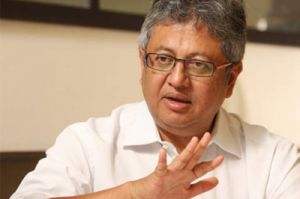Islamic values not the glue to bind Malaysia, says Zaid
(Malay Mail Online) – Multicultural Malaysia will not likely unite under the Islamic values that are increasingly dominating local society in the absence of a common set of national principles, said former minister Datuk Zaid Ibrahim.
The former Cabinet member in the Abdullah administration said that while the country once had the Rukun Negara, or National Principles, as a guiding core of universal values, this has since been eroded and replaced through the increasing emphasis on “Islamic values”.
Pressing on the importance for every country to have shared values, Zaid nevertheless expressed uncertainty whether using Islam as the basis of the core belief system would work given Malaysia’s diverse communities.
“Islamic values, being sourced from a particular religion, will find little acceptance in a multi-religious community.
“We see this in the continuing debate on hudud, and even if there were some ‘Islamic’ values that were similar to ‘national values’, it would be the result of an imposition by the government — not the kind of values freely accepted by the people,” the former Kota Baru MP wrote on his blog yesterday.
He also noted the incongruity of these so-called “Islamic values” with common humanity, pointing to the recent cases where Islamic religious authorities have sought to impose their will on religious minorities.
Among others, he cited the controversies arising from the confiscation of Christian holy books and raids on funerals and weddings in Selangor and Penang by Islamic religious authorities as examples of how such a value system would not be accepted universally in Malaysia.
“Could these be just values held dear by those who wish only to use God as an excuse to justify their violent ways? Certainly, these are not Malaysian values we want to teach our children,” Zaid added.
A recent study by by Hossein Askari, a professor of International Business and International Affairs at George Washington University, rated Malaysia as the 33rd most Islamic country in the world, behind the likes of Singapore and Israel in the index topped by Ireland.
In his study, Askari said Muslim countries placed low in the ranking due to their use of Islam as an instrument of power and politics.
Putrajaya has been increasingly accused of persecuting Malaysia’s religious minorities in a bid to appeal to its traditionally rural Malay-Muslim voter base.
Among others, it has outlawed Shiah — the second-largest denomination in Islam — and pursued the Catholic Church over the use of “Allah”, the Arabic word for God, in a Christian newsletter.
Umno and PAS are also now engaged in apparent attempts to introduce hudud, the Islamic penal code that prescribes stoning and the amputation of limbs as among its punishments, in the country.
While prevalent over the decades, the use of religion as a political platform accelerated after Election 2008 when the ruling Barisan Nasional (BN) lost its customary parliamentary supermajority in a so-called “political tsunami”.
The shift has also seen the rise of Malay-Muslim pressure groups such as Perkasa and Isma, who are increasingly vocal in their demands for the government to prioritise the community over all others in Malaysia.
Muslims make up 61.3 per cent of the Malaysian population, followed by Buddhists at 19.8 per cent, and Christians at 9.2 per cent, according to the latest census data from 2010.


